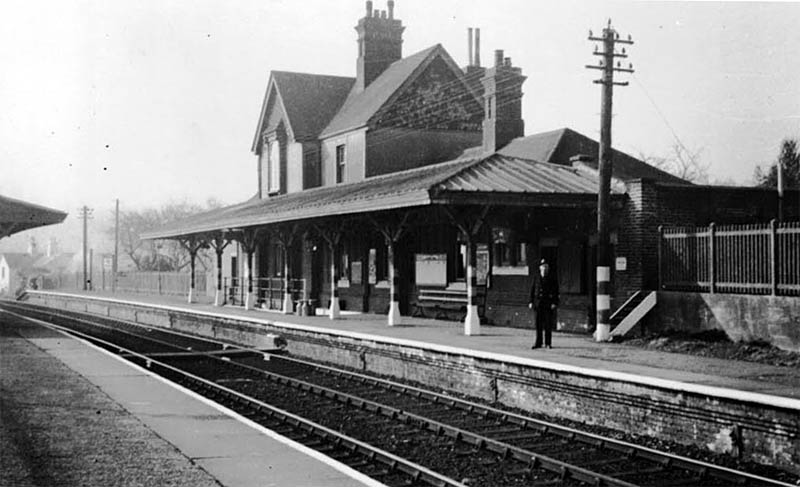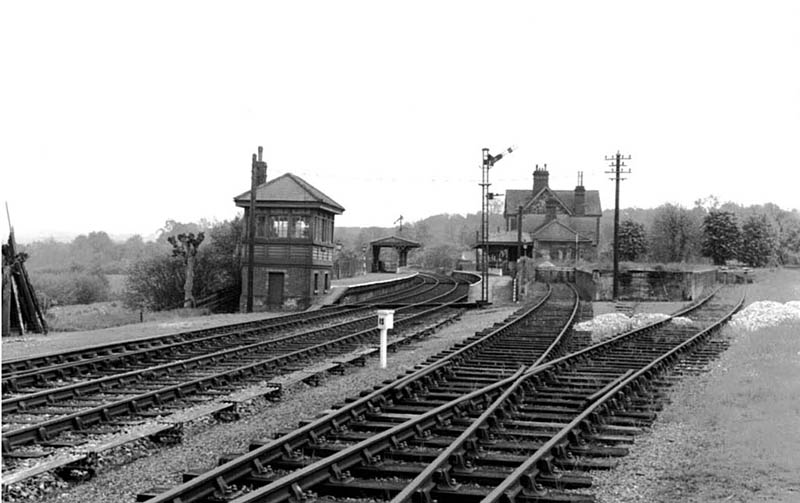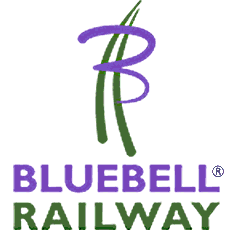Kingscote:
-
Visitor information -
History 1 -
History 2 -
History 3 -
History 4
Friends of Kingscote -
Goods Yard Project -
Track layout -
Kingscote Signalling -
Signal Boxes


History of Kingscote Station
– Kingscote in the 1950s
A TASTE OF LIFE IN 1953 AT KINGSCOTE
The Station Master in charge of Kingscote is located at East
Grinstead, the station being run by Porter-Signalmen. These are
Porters who spend less than 50% of their time in the signal box.
They sell tickets and deal with the few parcels in the ticket
office, see the few trains safely away from the platforms, keep
the station clean and the flower beds tidy, deal with goods
paperwork in the ticket office and help to shunt wagons around in
the yard. The basic working week is 40 hours, comprising 5
rostered 8-hour turns between Monday and Saturday. The sixth turn
or "rest day" may be worked at overtime rate if there is no "rest
day relief" man. Sunday is always a rest day. Pay has just risen
from £5.16.9 (£5.83) per week.
Kingscote Porter-Signalman Ernie Marshall lives in the station
house with his wife Marjorie. They have lived there since William
Parker moved out following his retirement in 1951 and they will
be the last BR tenants. Rent for the station house is in the
region of 15 shillings (75p) a week.
The first trains of the day are the 6.43 to Brighton and the
7.29 to East Grinstead. The last trains are the 9.1 pm to East
Grinstead and the 9.20 pm to Haywards Heath. A later train to
East Grinstead passes Kingscote, but is not booked to stop.
There are annual Best Kept Station Awards, which are presented
(for the Redhill District) during the following year. Kingscote
won an Additional Prize for 1952, while Sheffield Park won Second
Prize in Class E.
Austerity is still very much the reality of Britain. People
eat a healthy, although basic diet. Meat, bacon, butter, cheese,
margarine and cooking fats are still rationed, eight years after
the end of the Second World War. Tea came off ration in 1952 and
this year, eggs, cream and sweets came off - just in time for the
Coronation - with sugar in September. The most popular sweets are
Spangles and Polo, each "tuppence" or "thruppence" a pack and
Bounty chocolate/coconut bars.

Meat is still subject to rationing; the weekly meat ration
allowance having increased by one penny, to one shilling and
ninepence (9p). Bacon and ham are rationed separately; about 4
ounces in total a week per person being allowed. Consequently,
country people still keep chickens for eggs and meat. Pigeons are
shot for food. Wild rabbits are also hunted for food. They are
usually shot, snared or "rooted out" by a terrier dog or ferret.
However, care must be exercised when selecting a wild rabbit, as
there is an outbreak of myxomatosis, first discovered near
Edenbridge (Kent) this autumn.
Few people have a refrigerator, relying on cool larders (like
the one off the station house kitchen) and gauze-covered "meat
safes". Many homes, including the station house, have no
electricity yet. Most food is bought fresh so shopping can be
undertaken almost daily. Blocks of ice cream can be bought at
sweet shops that have an electric freezer. It is wrapped in
newspaper to insulate it for the journey home, but must be eaten
within a couple of hours. At the seaside, fairs or carnivals
etc., individual ice creams between wafers or in cornets can be
bought from the man on his tricycle. This has an insulated box
containing "dry ice" (solid carbon-dioxide) in which the
ice-creams are carried.
Money is short and the wartime philosophies still endure, so
people grow most of their own vegetables and fruit. Typical
garden-grown vegetables are cabbages, carrots, broad beans, peas,
potatoes, runner beans and marrows. Apple or pear trees,
raspberry canes, blackcurrant bushes and rhubarb may also be
found in country gardens. People regularly pick wild blackberries
when in season. The station house and railway cottages have
gardens in which their tenants can grow some food, but many folk
have an additional "allotment", like the one at the south end of
the gardens of the railway cottages. This allotment boasts some
old quince trees. The fruit of these trees can be used to make
quince jelly, the fore-runner of orange marmalade. During the
War, housewives were encouraged to "preserve" fruit by home
canning or bottling in special jars.
There are old apple and pear trees in the station house
garden. When the fruit is in season, it can be exchanged with
engine crews for some coal off the locomotive. Coal is used to
fire the cast-iron cooking "range" in the kitchen (examples of
modern versions being the Aga and Rayburn), the clothes washing
"copper" in the scullery or to fuel the open fires in the other
four rooms.
Gas is produced from coal and its supply is generally
restricted to urban areas near the gasworks. There is a gasworks
in East Grinstead but no pipes are laid in this direction.
There is no mains water at Kingscote yet. Most houses in the
area have or share a well. The station's water supply (from its
well behind the down platform) has been shown to be now unfit for
drinking, but still satisfactory for washing. Drinking water is
delivered to the station by train in small galvanised churns. You
can see these standing on the up platform in the photo below.

This view of the up platform was taken by Mr. G S Robinson on
1st. April 1955. We do not have the name of the member of station
staff in attendance although it could well be Ernie Marshall.
Note that the wartime white striping (applied to reduce accidents
during the night-time "blackout" when the station platforms would
have been in total darkness) is still quite clear on the canopy
columns and telegraph pole. Signal bell codes and telephony were
carried along bare copper wires suspended from these poles on
insulators. Note the wooden steps (again, painted white) to gain
quick access to the goods dock and also the porters' board
crossing between platforms.
There is a ready supply of lamp oil (for the signal lamps,
station and platform lighting) in the station Lamp Room. One of
the Porter-Signalman's duties is to light the lamps at dusk,
extinguish them in the morning, refill the tanks and trim or
replace the wicks.
Ordinary people still walk fair distances in the country
although most have bicycles. Motor cars are a common sight, but
most people do not own one. One of the modern family motorcars on
sale is the Morris Oxford (similar to but larger than the Minor).
Public transport is important. Local people catch the train to go
to the cinema in East Grinstead. They may cycle in or use a bus
to go shopping. The green London Transport 473 bus runs from
Horsham to Edenbridge via Turners Hill and East Grinstead. Modern
London Transport single-deck, diesel-engined buses (RF or GS)
operate the route and the stop is at the end of Station Road, on
the main road. Most lorries are powered by petrol engines. They
are not fuel efficient, are inherently slow and are additionally
subject to either a 20 or 30 mph. speed limit. Some local
deliveries, particularly brewers' drays, are still
horse-drawn.
King George VI, who led us through the Second World War and
whose picture hangs above the ticket window in the booking hall,
died in February last year. His eldest daughter, Princess
Elizabeth, was crowned Queen in June in a spectacular ceremony
which was transmitted live by radio to every corner of the
Empire. The event overshadowed the climbing of Mount Everest by
Edmund Hillary and Sherpa Tensing on 29th. May. For the first
time, a Coronation was covered by the new media - television.
Queen Mary, the mother of King George VI, passed away earlier
this year.
Televisions are expensive. A Ferguson 998 table top set with a
12 inch screen costs 49 Guineas (£51.45). A similar 17 inch
set costs 69 Guineas (£72.45) while a 17 inch
floor-standing "console" set costs around £100. They can be
rented but, unlike radio sets, they require mains electricity.
Radios are normally powered by lead-acid cells or batteries known
as "accumulators". These have to be charged up regularly and
would probably have been taken to the local bicycle shop or
garage for this to be done; or perhaps one of the local farms has
a petrol dynamo. For the majority of the population who did not
have access to a television, a feature film "A Queen is Crowned"
was made and was shown soon afterwards at local cinemas.
Among the films being shown at the cinema earlier in the year
were the war film, The Cruel Sea (starring Jack Hawkins and
Donald Sinden) and comedy, The Titfield Thunderbolt (starring
Stanley Holloway, George Relph and John Gregson). Summer saw
the release of the popular comedy, Genevieve (starring John
Gregson, Dinah Sheridan, Kenneth More and Kay Kendall).
Some homes may have a (clockwork) gramophone, which you need
to wind up with a removable handle in the side. The circular 78
r.p.m. records are not that cheap but are growing in popularity.
The New Musical Express introduced a "Top 12" record sales chart
last year. This year, two of the most memorable records at
"number one" are "I Believe" by Frankie Laine and "Don't Let The
Stars Get In Your Eyes" by Perry Como, although "(How Much Is
That) Doggy In The Window" by Lita Roza was number one for one
week in April.
The radio is used sparingly, but many wives insist on
listening to the 15-minute episode of "The Archers" every weekday
evening on the Light Programme. There is an hour-long "Sports
Report" at 5 p.m. on Saturday evenings during the football
season. Children listen to "Children's Favourites" on Saturday
morning with Uncle Mac. Billy Cotton's Band Show is regular
listening on Sunday afternoon. The news can be heard on the Home
Service where there are five broadcasts a day, but some people in
the country rely on a neighbour or friend passing on the previous
day's newspaper to keep them abreast of happenings further
afield.
In June, Blackpool won the FA (Football Association) Cup; the
team including a 38-year old Stanley Matthews. In August, England
beat Australia at cricket to win the Ashes - the first time since
1932.

Tragically, on the night of 31st. January, over three hundred
people were killed during floods in Essex, Norfolk and
Lincolnshire, and the ferry "Princess Victoria" was lost in the
Irish Sea. Even more (over 1800) died on the same night in
Holland.
During the year Welsh poet Dylan Thomas passed away, as did
also Django Reinhardt, the jazz guitarist and Hank Williams, the
American "country music" singer.
John Christie was hanged in July at Pentonville prison, for
the murder by strangling of his wife and six other women at his
home in Notting Hill, London.
Around the world, Josef Stalin, the wartime leader of the USSR
died in March. He has been succeeded by Nikita Krushchev. Britain
has recognised the Republic of Egypt under General Naguib.
Many families have more than just a passing interest in what
is going on round the world. Young men between the ages of 18 and
26 are still required to undertake two years of National Service.
The army is presently involved in combating Mau-Mau terrorism in
Kenya and troops have just been sent to British Guiana.
Fortunately, in Korea (where British troops formed part of the
United Nations army fighting the North Koreans from 1950) an
armistice was signed on 27th. July at a place called
Pan-mun-jom.
There is a little bit of local talk about the declaration in
November that Piltdown Man was a hoax. In 1911, what seemed to be
the remains of an early man, supposedly some 500,000 years old,
were discovered near the local village of Piltdown, near
Uckfield. This creature was hailed as an almost unique example of
the "missing link" between the apes and man for many years.
However, recent chemical tests carried out by Oxford University
and the British Museum revealed that all the bones had been
stained to make them appear fossilised; and that the jaw of the
skull was from an orang-utan!
Not so many people have telephones, particularly in the
country. It is expensive to rent the line and instrument, even if
the wires have been run near to your home. In Britain, the
telephone system is run by the GPO (General Post Office). There
is a coin-operated call box for public use inside the booking
hall of the station. However, it is unlikely that many of your
friends have a telephone yet.
The post is fairly reliable (with next-day delivery to most
places in Britain) and there is a post box in the front wall of
the station. A network of rail "Travelling Post Offices" traverse
the major routes of the network overnight. Mail to and from
London, Dover (for the Continent), the West, Wales, the North and
Scotland is carried and sorted on the train and dropped off en
route. The Royal Mail is also carried in bags on many ordinary
passenger or parcels trains during the day. Urgent messages may
be sent by telegram from the post office in East Grinstead. A
telegram message would be delivered to you, after receipt at the
post office, by a GPO motor-cyclist.
British Railways were actively recruiting during 1952 (the
advert above is from a popular magazine during that year). The
railways were seen as a secure job - a job for life - but things
were changing........

This view of the station looking in the "down" (away from
London) direction was taken by Denis Cullum on 27th. May, 1955 -
the day prior to closure. Note the concrete milepost (15 miles -
measured from Culver Junction) and the short piece of vertical
rail at the end of the platform fence. This was painted with red
and white stripes and denoted the boundary point between
permanent way gang's responsibilities. A siding did once exist
between the two seen here and there was an end-loading facility
on the end of the goods dock. This probably existed during WW2 to
assist with the unloading of tanks or other tracked vehicles,
which were stored prior to "D-Day" in the woods off the road
uphill from the station.


Return to BRPS Home Page,
to the Timetable or to Special
Events
Kingscote:
-
Visitor information -
History 1 -
History 2 -
History 3 -
History 4
Friends of Kingscote -
Goods Yard Project -
Track layout -
Kingscote Signalling -
Signal Boxes
Visitor Info. -
Museum -
Trust -
Catering -
Contacts -
What's New -
Projects -
Locos -
Carriages & Wagons -
Signals -
History -
Other -
Links -
Search -
FAQ
Why not become a BRPS Member? -
Get more involved as a Volunteer
Your ideal Film/TV location?
 © Content copyright Roger Barton and Martin
Skrzetuszewski.
© Content copyright Roger Barton and Martin
Skrzetuszewski.
Created 9 January 2008 by Nick Beck, and last updated 29 March 2020 by Richard Salmon.
© Copyright BRPS. Privacy Policy
|













